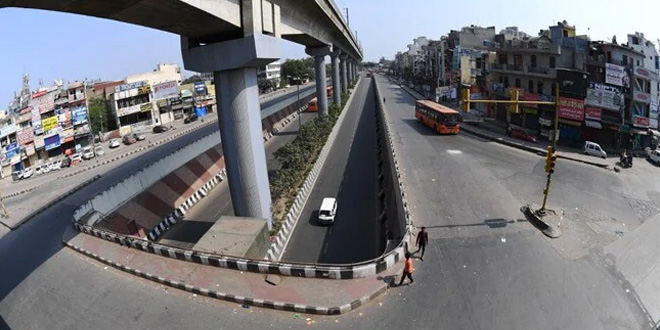New Delhi: Stunned by the rapid mounting of coronavirus around the world, several countries have imposed a lockdown, replicating China where the virus was first reported in December last year. According to World Health Organisation (WHO) lockdown is an important measure that can help in buying time and reduce pressure on medical facilities in a country. However, experts are of view that while encouraging people to stay indoors will help reduce the pressure on a country’s health infrastructure, it alone will not be able to tackle the coronavirus crisis and a specific and targeted approach to curb the virus is absolutely imperative.
Also Read: United Nations Launches COVID-19 Global Humanitarian Response Plan
WHO Director General Tedros Adhanom Ghebreyesus took to Twitter and said,
To slow the spread of #COVID19, many countries introduced “lockdown” measures. But on their own, these measures will not extinguish epidemics. We call on all countries to use this time to attack the #coronavirus. You’ve created a 2nd window of opportunity.
To slow the spread of #COVID19, many countries introduced "lockdown" measures. But on their own, these measures will not extinguish epidemics. We call on all countries to use this time to attack the #coronavirus.
You've created a 2nd window of opportunity. pic.twitter.com/jupcsdYnWm— Tedros Adhanom Ghebreyesus (@DrTedros) March 25, 2020
India has also imposed a 21-days lockdown to encourage social distancing as part of the strategy to overcome the coronavirus crisis. The state governments and the union territory administrations have been further advised to impose curfew wherever necessary if people continue to go out of their homes. While announcing the lockdown, Prime Minister Narendra Modi said,
To save India, to save every citizen, you, your family… every street, every neighbourhood is being put under lockdown. Forget about leaving home in the next 21 days… If you do not follow this, you will invite the virus home.
However, Dr. Surya Kant, Professor and Head of Department of Respiratory Medicine, King George’s Medical University (KGMU) Lucknow believes that physical distancing measures are very useful but along with this there is an urgent need to ramp up testing, identifying people who have the virus and contact tracing. He said,
If a person got infected a day before the lockdown, that patient may develop symptoms even after two weeks and in the meanwhile infect all the members of the family. Thus we need to test suspected cases and isolate them and also test their contacts. We have to lead by the examples of South Korea and Japan, where they have managed to flatten the curve with wider testing and lockdown with self-discipline. People who have a travel history and those who don’t, both need to be tested.
Also Read: Coronavirus Outbreak: Here Are The Answers To All Your Frequently Asked Questions On COVID-19
According to the revised strategy of testing for COVID-19 infection, issued by the Ministry of Health and Family Welfare last week, all asymptomatic individuals who have undertaken international travel in the last 14 days, should stay in home quarantine for at least 14 days. They should be tested only if they become symptomatic (fever, cough, difficulty in breathing). Besides, all family members living with a confirmed case should be home quarantined.
There have been questions raised on the quantum of testing being undertaken in the country because of the lack of adequate health infrastructure and high density of population. In order to fill this gap, private hospitals are now joining the government in the fight against coronavirus. According to Dr. Hari Prasad, President, Hospitals Division Apollo Hospitals,
All hospitals of Apollo Hospitals Group provide screening facilities and under its new a new initiative called ‘Project Kavach (shield), a comprehensive and integrated response plan to fight the COVID-19 disease. Testing of people needs to be continued in an aggressive manner even during the lockdown.
Dr. Meenakshi Jain, Associate Director, Internal Medicine, Max Healthcare, Patparganj and Noida asserted that more effective isolation of infected people along with enhancement of the availability of protective gears for the healthcare staff is the need of the hour.
Social Impact Of The Lockdown Need To Be Addressed Immediately To Avoid Community Transmission
According to Mukesh Goswami, social activist and member of a non-governmental organisation, Mazdoor Kisan Shakti Sangathan, Rajasthan, a sudden lockdown has caused panic and chaos among the people from economically and socially marginalised sections. He said,
People engaged in informal sector, migrant labour and those earning livelihood by doing petty jobs are all out of work. This is a serious concern. A lot of them are going back to their villages in groups and since there is no public transport facility functional currently, they are all going back on foot. They are exposed to all kinds of virus and problems.
He further said that people living in slum areas in cities are also living together are not able to practise social distancing because of lack of space and resources. While highlighting the hardships of the poorer sections of the society, he said,
These people do not have food to eat nor do they have money to buy food. Some NGOs are providing food and the needy people come to have this food along with their families and neighbours. Social distancing is secondary for them as filing the stomach of their children and their own is more urgent to them.
A total of 724 confirmed cases of COVID-19 have been reported in India, as on March 27 (9:15 AM), out of which 67 have recovered and 17 have died, as per the data provided by the Minister of Health and Family Welfare (MoHFW).
Also Read: Centre Issues Advisory On Personal Protective Equipment To Protect Healthcare Workers From COVID-19
[corona_data_new]






























